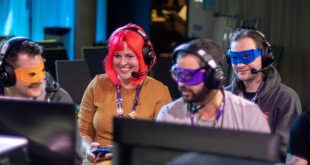Every month an industry leader wraps up MCV/DEVELOP with their unique insight. This month, we talk to Sitara Shefta, head of studio at No Brakes Games.
The studio is in Tenerife but you must be the only devs on the island. So (weather aside) what’s the thinking behind that?
Everyone loves to go on holiday and we love to make games, so why not have both? That was the philosophy behind opening a studio here. We wanted to offer people a different lifestyle opportunity, but one which is still within easy reach of mainland Europe. So far, we’ve managed to attract talent from various locations which has been fantastic. We want to offer a different lifestyle to that of the more typical city life we’ve been used to back in the UK.
You’ve worked at big studios before, EA and Sumo, but do you prefer leading a smaller team?
I think regardless of studio size, it’s the people that make it a great place to work. Being in a smaller team means that you get to know everyone more personally, and I think this contributes to building a great culture. The nature of game development also becomes less restrictive as it truly means that everyone can be hands-on, creative and impactful towards the game we’re making. I love leading a smaller team, but that’s because of the people that make it.
With the greatest respect to your current role, what is/was your dream job?
I love helping people; that’s where I find happiness and when a team succeeds that brings me joy. From previous roles, I saw the best and worst bits of making a game, but this taught me how I wanted to see things done, so I knew that I wanted to move into a leadership position. Equally I love making games, so running this studio has become my dream job. I love it, it brings me the best of both worlds.
You’ve worked with children in the past, and on kids games, are growing minds something that intrigues you?
When I was playing Super Mario on the NES, my mum was playing co-op with me, so I don’t really consider many games to be specifically ‘kids’ games’ – I think there’s a beauty in appealing to a wide audience, and making games that people of any age can play together and have fun. It’s not necessarily growing minds that intrigue me, it’s different perspectives, and how you can bring people together in games.
The studio was born out of Human Fall Flat, an enormous hit, do you feel extra pressure working on a follow-up?
We’re super proud of Human: Fall Flat and the community that has been built around it. Whatever we release next, I’m sure we will be proud of it because we’re a quality focused team. And who said anything about a follow-up…?
What was your reaction to the recent Ukie census on the industry in regard to BAME representation?
I was surprised – 10 per cent of people working in games are BAME? Of course, the results reflect those who participated in the census, but it’s not a true representation of my own personal experiences. The census also noted that BAME people are noticeably less represented in senior positions and I agree that I haven’t known many in senior or creative decision making roles. It honestly needs to be fixed if we’re to move forward as a progressive industry, one that truly reflects our players. Now we have more organisations such as POC in Play leading in these initiatives it ultimately will.

 MCV/DEVELOP News, events, research and jobs from the games industry
MCV/DEVELOP News, events, research and jobs from the games industry




